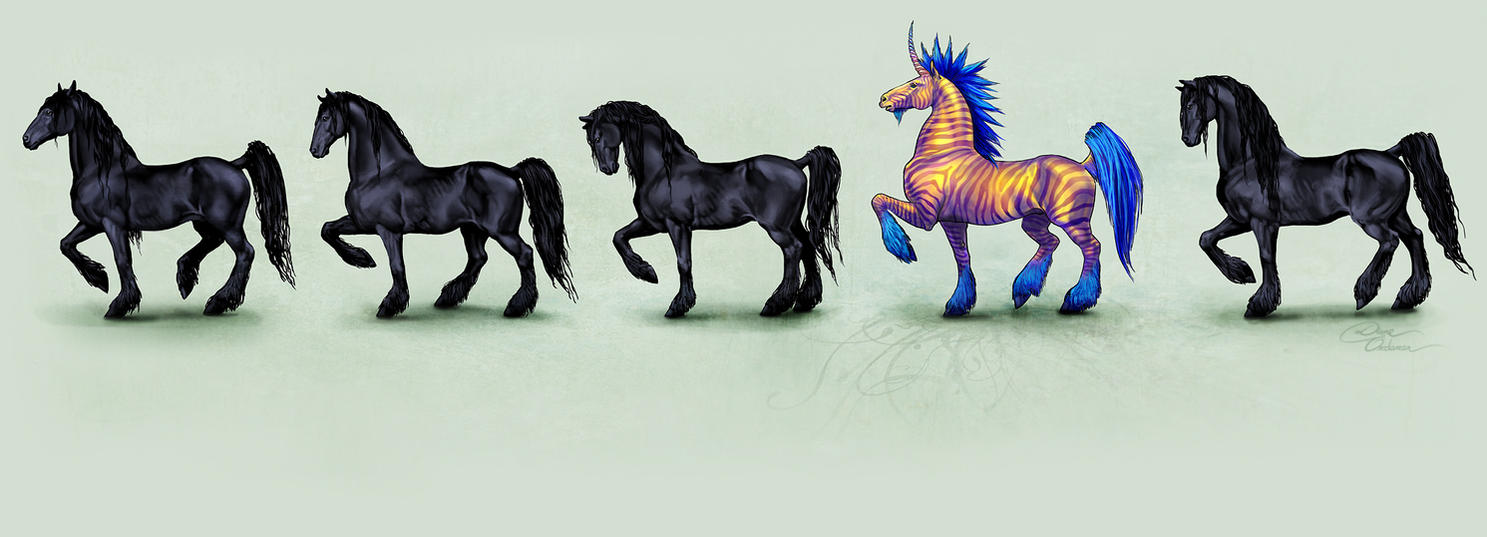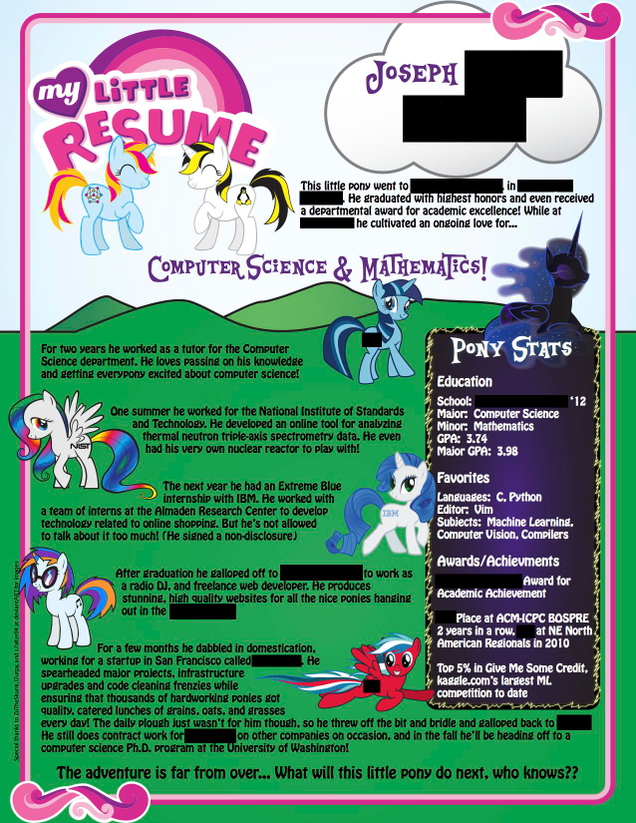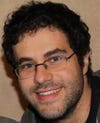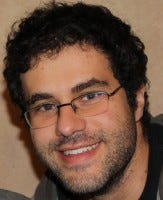Preparing for GDC 2015
You'll be graduating in 2015, and GDC is by far the best opportunity for meeting people and, who knows, maybe even getting the job you want. But you HAVE to be prepared for it, and that preparation starts now.

Hi everyone! I'm graduating in May 2014 from The Guildhall at SMU, and as such this year's GDC was my job fair, carefully scouting the Career Center, talking to as many people as possible and applying to a ton of jobs (so far, I've applied to 20+ companies, and I'm just getting started). It was a fantastic experience, yet I noticed that there were some students who were not quite ready, either by a lacklustre portfolio or because they had a good portfolio but couldn't access it at the Career Center.
That, for lack of a better word, SUCKS. You want to be prepared for March 2-6, 2015, with content you are really proud of and with a kickass portfolio. You need to be prepared for GDC 2015. It may seem like a daunting task, but here's the good news: you can start preparing TODAY. Below are some tips that, in my opinion, may help you prepare for the largest gathering of developers in the world.
This post is especially aimed at game development students, though I think it may also help people who do not have an online portfolio or want to break into the industry and are not part of any game program.

Scar said it best. FACT.
1- Decide Your Specialty and Stick to It: Unless you want to be a jack-of-all-trades at an indie developer (and that's a valid career path, mind you), chances are you'll need to choose a specialty, since that's what companies, especially the ones at the Career Center, are looking for: specialists.
This means making some tough decisions: like animation and environment art? I'm sorry, you'll have to pick one. Sure, you can still do the other, but your choice has to be at the forefront of your portfolio. Same thing goes to designers and programmers: if you like AI and tools programming, only display one in your portfolio (and the other in a page like "Other Projects").
I had to do the same choice, as well: I like both narrative design and scripting. But since I come from a more technical background and really enjoy scripting, I focused my portfolio on the scripting, which is why all I talk about on my site (http://www.joseabalos.com) are the scripting challenges I faced while doing several projects.
This is the first and most important step, since this choice will guide the rest of the actions you'll do in the following year.

Like this, but for real
2- Build Awesome Content: This is the most time consuming part of the process, and what you should focus during this year. My best advice would be to take every school project as a portfolio building opportunity. The effects of this perspective are twofold: first, it focuses the project's efforts towards your especialty, and second, it gives you a motivation for pushing your boundaries and set your standards for not an A-grade in the class, but rather industry quality. And don't panic!

All the time
However, there is still one distinct issue: distinguishing yourself from your peers. You can have an incredibly polished level, but if it doesn't have any distinguishing qualities, it'll just be another Crysis level, or just another Skyrim level... You need to add the "secret sauce".
3- Make the Content Reflect Who You Are: What are your passions, both games and not-games related? Do you like architecture, theatre, cheesy sci-fi series, folklore, arcade games, whatever? You need to answer this question because bringing those passions into your projects is what will set you apart, what will make others look at your stuff and say that only you could do something like this.
As a personal example, I grew up playing adventure games like Monkey Island or The Longest Journey, so when the chance showed up of doing whatever we wanted in the Gears of War engine, I immediately thought of doing an adventure game. And since I love scripting and adventure games, it was the perfect project for me. While the end result is not nearly as good as those classics, it's still a unique experience.
For artists, it's the same thing. Environment artist and like horror movies? Then make a creepy environment like an abandoned cabin in the woods. Gameplay programmer and like Doctor Who? Theme a game set in that license. It's already happened, you know? It is possible to distinguish yourself from other people, no matter your especialty.

Maybe not as flamboyant, but you get the idea.
There is an important question that needs to be answered: what about music, or licensed material like art assets and the like? Since the purpose of its use is to show your skills at an online portfolio and not making money, ALWAYS CREDIT EVERYTHING. A txt file that includes the sources of the borrowed assets is more than enough, for portfolio purposes. If you use music in trailers, always credit it at the end. It's always better to be safe than sorry.
4- Make Screenshots of Your Work-In-Progress: This applies mostly to artists and designers, but showing your models or levels at different stages of completion gives prospective employers a good view at your thought process and how you can take an idea from conception to completion.
5- Make Backups: Keep many backups of the work in an external hard drive, so you can always go back and take more screenshots if you need it. For example, I tend to keep my backups in a different drive with names like 01- Project Name_Descriptive Text. That way, I can take a look at the folder and know immediately which one to open to take screenshots. Besides, engines can be buggy at times, and there's nothing more heartbreaking than having a corrupt file and losing +100 hours of progress.

Your face when you lose all your progress. I wish I was kidding
6- Register Your Contributions in Team Projects: Although companies will (hopefully) hire your for the skills you show in your individual work, showing them that you can also work (hopefully) well with other people is crucial. As such, showing your team projects in your portfolio is fair game.
HOWEVER, when talking about your team games you need to discuss your especific contributions to the game. This involves showing levels, models, game features, AI engine, whatever it is you did. Again, know what you want to focus on, so you can do exactly that in your team projects! You might be in a project where you might not be able to do exactly what you want, but there are always opportunities for doing tasks related to your especialty, and you should jump to do those whenever you can.

More portfolio pieces AND you get to be of more use to your team.
7- Start Making Your Resume: Let's be honest, writing a resume is boring. As such, it might be tempting to focus a lot on the portfolio and give short thrift to the resume. That is a fatal mistake, because although the portfolio is crucial, every single company will ask you for your resume, including most of the companies at the Career Center. And having a crappy-looking resume will be a huge buzzkill, no matter how good your portfolio is.
Why? Because, in the end, your presentation to companies lies on three pillars: Portfolio, Resume and Cover Letter. If the quality of one of these components is low, the message you're sending to a company is that you don't care about them. And if you don't care about them, why should the care about you?
As such, one way you can start building a good resume is start making one today. There are plenty of good resumes out there (here, you can even use mine as a starting point), which you can later revise with faculty so they can help you make it better and better. Once you have a basic resume, updating it is gonna be much simpler. You don't need to make it look unique, but be sure to put your most important skills on top.
PROTIP: Once you have your resume in Word format, make a .txt version of it. Many times, you'll have to type in a plain text version of it, and having it already available is just gonna be much easier.

Incredibly risky, but certainly unique. If I were making a MLP game, I'd hire this person right away
7- Register a Domain with Your Name: In this business, if you don't have an online portfolio, and unless you're Shigeru Miyamoto, you don't exist. This goes doubly true for artists. As such, you need visibility, and it starts with the URL associated with your name.
There are many places where you can register a domain (I use Dreamhost), but no matter what you choose, make sure it has your name on it. If it's already taken, use your name and specialty.
8- Make Trailers and Playthroughs: Once you have your portfolio piece ready, a good idea is to make a trailer for it. Why? Because at GDC you'll only have enough time to show recruiters one portfolio piece, and showing a well-made trailer can even the odds in your favor.
For artists, I can't recommend Sketchfab enough. It allows you to show your 3D models in the browser. Unfortunately, it doesn't allow animation cycles, so for those you'll have to rely on Youtube or Vimeo.
This trailer helped me get the attention of companies during this year's GDC:
9- Get a Tablet and Make an Offline Version of Your Portfolio: I can't express this enough. Having a tablet is the best way of showing your portfolio to prospective companies. It doesn't have to be a $600 iPad, there are fantastic alternatives for $200 and even less, like the Kindle Fire HD.
However, this tablet will only be useful if you upload the contents of your portfolio to the tablet itself. This is because the Wi-Fi at GDC, and especially at the Career Center, is AWFUL. I saw many people who would struggle trying to load their portfolios while at the booth, only to have an awkward moment when it just wouldn't load. You don't want to be that person.
There are apps for Android and iOS that let you create an offline version of your portfolio. In addition, upload your screenshots and trailers to your tablet and check that they look good.

Really, you don't want to be that person.
10- Get a Vimeo Account: Or Youtube account, doesn't matter. If you're gonna be uploading trailers, you need to do it from your account. Same thing goes for your team projects: it's always better to upload them to your account.
11- Get Plane Tickets for the Whole Week: Even if you plan on getting the Expo pass, I can't recommend enough that you go there the whole week, even before. I say this because, surprisingly enough, most of the networking at GDC does not happen at the Career Center. It happens at the events like mixers, and if you get to San Francisco on Tuesday night, you'll miss a lot of that socializing.
That's all the advice I have for now. Getting your foot in the door, especially at an entry level position, is a difficult task, and this is a marathon, not a sprint. As such, if you prepare from now and emphasize your school work and personal projects toward a single goal, which is building your portfolio, you'll be at a better position than most people during next year's GDC.
Again, you're in the long haul for this. Build your portfolio, have fun, and hang in there. March 2, 2015 is coming, and we're already in April. What will you do with the time you have?
Feel free to email me at [email protected]">[email protected] if you have any questions. We're all in this together.

Words to live by
About the Author(s)
You May Also Like







.jpeg?width=700&auto=webp&quality=80&disable=upscale)








